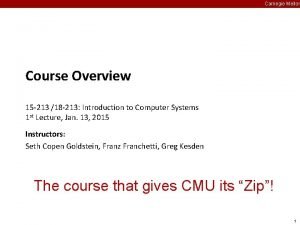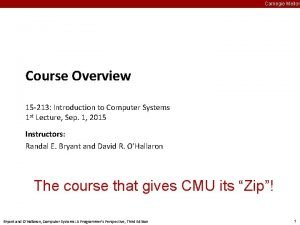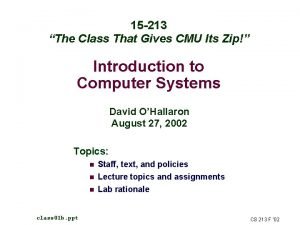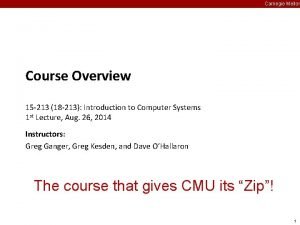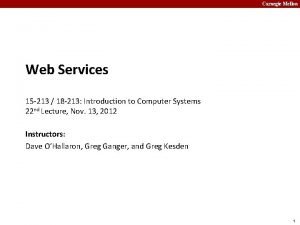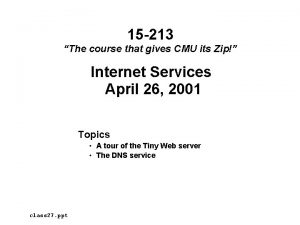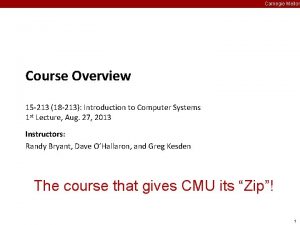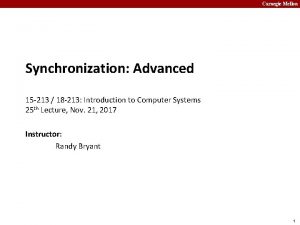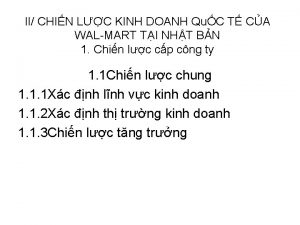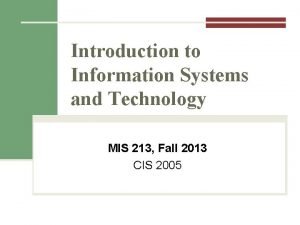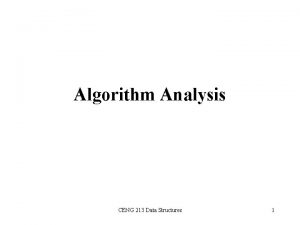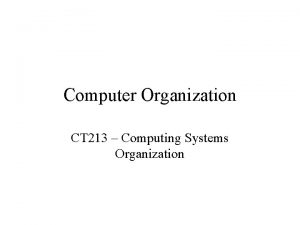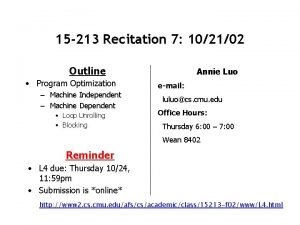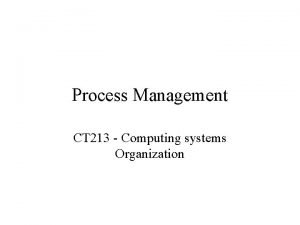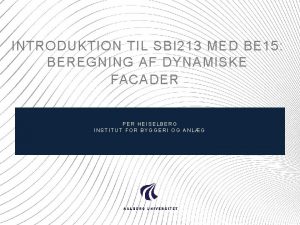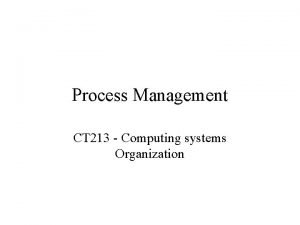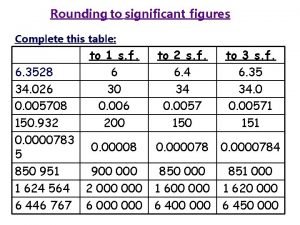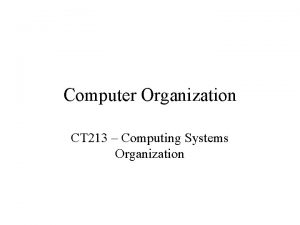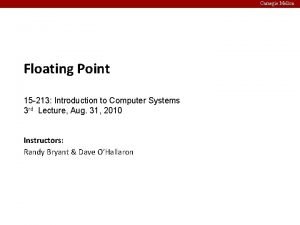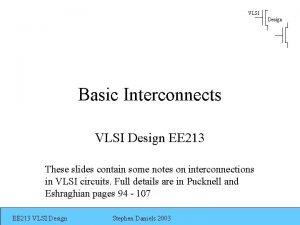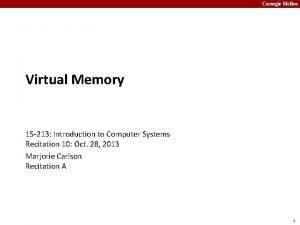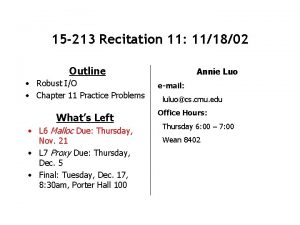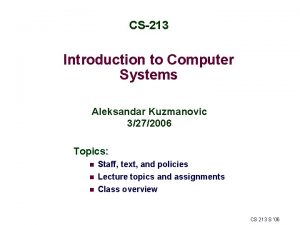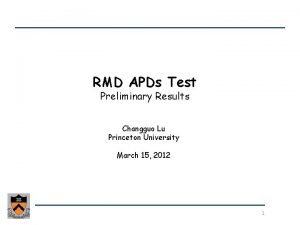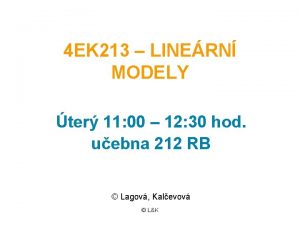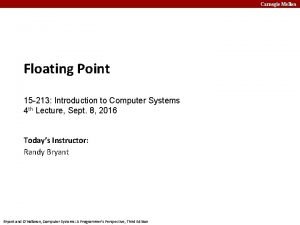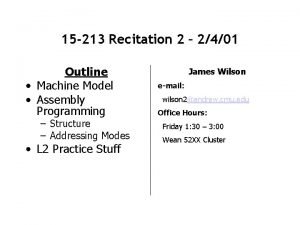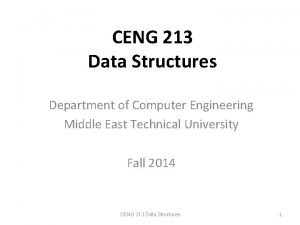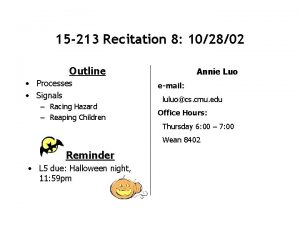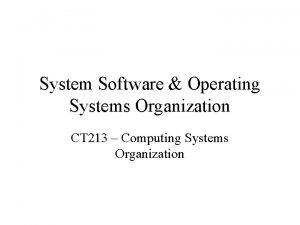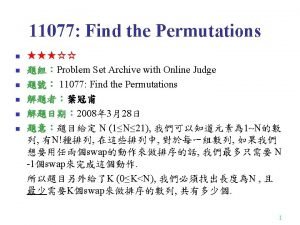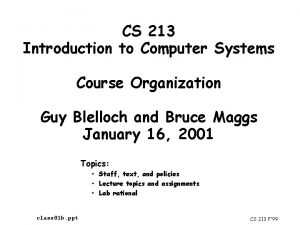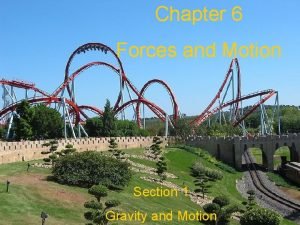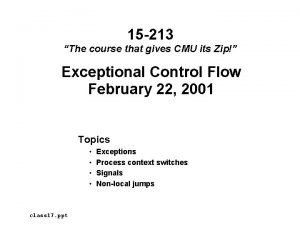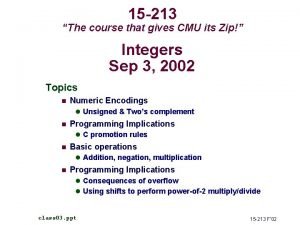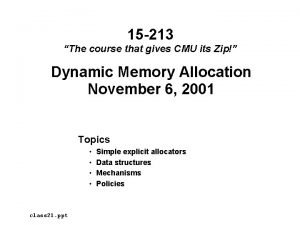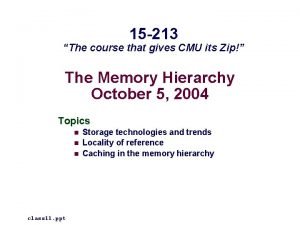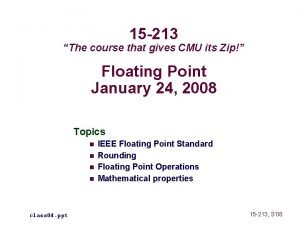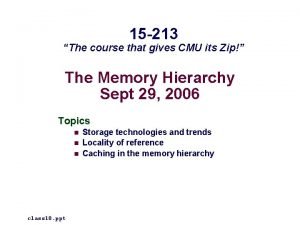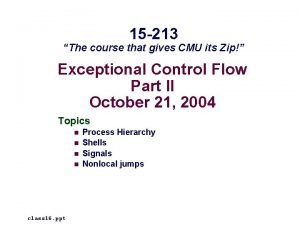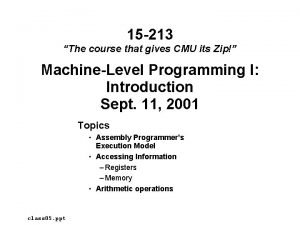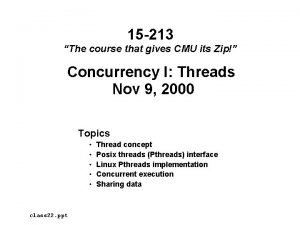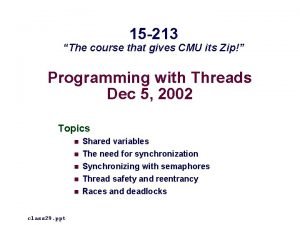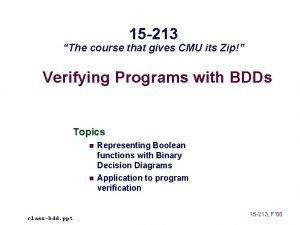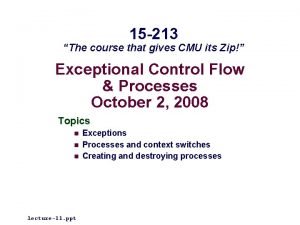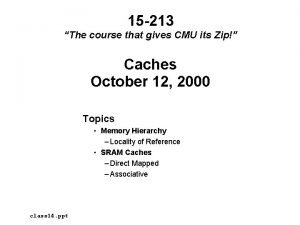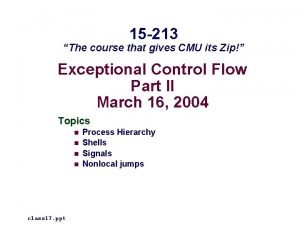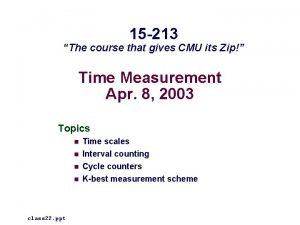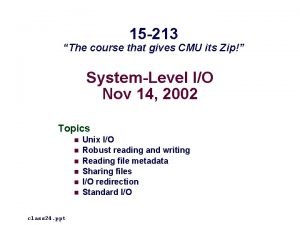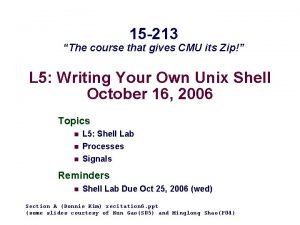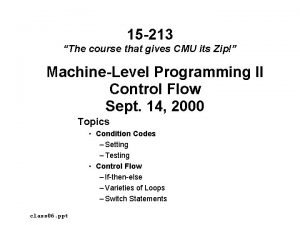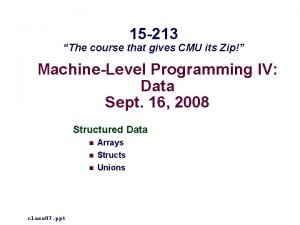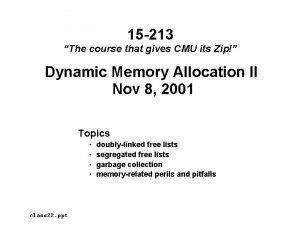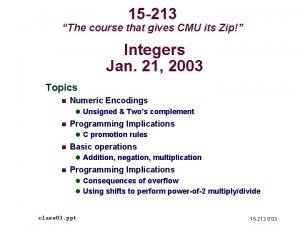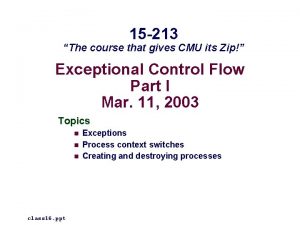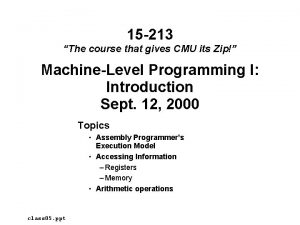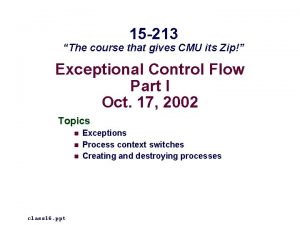15 213 The course that gives CMU its




















































![x 86 -64 Call using Jump long scount = 0; /* Swap a[i] & x 86 -64 Call using Jump long scount = 0; /* Swap a[i] &](https://slidetodoc.com/presentation_image/6d5ec0919193c1572dff44cde4479270/image-53.jpg)
![x 86 -64 Stack Frame Example long sum = 0; /* Swap a[i] & x 86 -64 Stack Frame Example long sum = 0; /* Swap a[i] &](https://slidetodoc.com/presentation_image/6d5ec0919193c1572dff44cde4479270/image-54.jpg)




- Slides: 58

15 -213 “The course that gives CMU its Zip!” Machine-Level Programming III: Procedures Sept. 15, 2006 x 86 -64 IA 32 n n n stack discipline Register saving conventions n Argument passing in registers Creating pointers to local variables n Minimizing stack usage n Using stack pointer as only reference class 06. ppt 15 -213, F’ 06

IA 32 Stack n Region of memory managed with stack discipline n Grows toward lower addresses Register %esp indicates lowest stack address n Stack “Bottom” Increasing Addresses l address of top element Stack Pointer %esp Stack Grows Down Stack “Top” – 2– 15 -213, F’ 06

IA 32 Stack Pushing n pushl Src n Fetch operand at Src Decrement %esp by 4 n n Stack “Bottom” Increasing Addresses Write operand at address given by %esp Stack Pointer %esp Stack Grows Down -4 Stack “Top” – 3– 15 -213, F’ 06

IA 32 Stack Popping n popl Dest n n Read operand at address given by %esp Increment %esp by 4 n Write to Dest Stack “Bottom” Increasing Addresses Stack Pointer %esp Stack Grows Down +4 Stack “Top” – 4– 15 -213, F’ 06

Procedure Control Flow n Use stack to support procedure call and return Procedure call: Push return address on stack; Jump call label to label Return address value n Address of instruction beyond call Example from disassembly 804854 e: e 8 3 d 06 00 00 8048553: 50 n call 8048 b 90 <main> pushl %eax l Return address = 0 x 8048553 Procedure return: n – 5– ret Pop address from stack; Jump to address 15 -213, F’ 06

Procedure Call Example 804854 e: 8048553: e 8 3 d 06 00 00 50 call 8048 b 90 <main> pushl %eax call 8048 b 90 0 x 110 0 x 10 c 0 x 108 123 0 x 104 0 x 8048553 %esp 0 x 108 %esp %eip 0 x 804854 e 0 x 108 0 x 104 %eip 0 x 8048 b 90 0 x 804854 e %eip is program counter – 6– 15 -213, F’ 06

Procedure Return Example 8048591: c 3 ret 0 x 110 0 x 10 c 0 x 108 123 0 x 108 0 x 104 0 x 8048553 %esp 0 x 104 %eip 0 x 8048591 123 0 x 8048553 %esp 0 x 104 0 x 108 %eip 0 x 8048553 0 x 8048591 %eip is program counter – 7– 15 -213, F’ 06

Stack-Based Languages that Support Recursion n e. g. , C, Pascal, Java n Code must be “Reentrant” l Multiple simultaneous instantiations of single procedure n Need some place to store state of each instantiation l Arguments l Local variables l Return pointer Stack Discipline n State for given procedure needed for limited time l From when called to when return n Callee returns before caller does Stack Allocated in Frames n – 8– state for single procedure instantiation 15 -213, F’ 06

Call Chain Example Code Structure yoo(…) { • • who(); • • } n – 9– Call Chain yoo who(…) { • • • am. I(); • • • } Procedure am. I recursive who am. I(…) { • • am. I(); • • } am. I 15 -213, F’ 06

Stack Frames Contents n Local variables n Return information Temporary space n yoo who am. I Management n Space allocated when enter procedure l “Set-up” code n Deallocated when return l “Finish” code Pointers n n – 10 – Stack pointer %esp indicates stack top Frame pointer %ebp indicates start of current frame Frame Pointer %ebp Stack Pointer %esp proc Stack “Top” 15 -213, F’ 06

Stack Operation yoo(…) { • • who(); • • } – 11 – Call Chain yoo Frame Pointer %ebp Stack Pointer %esp • • • yoo 15 -213, F’ 06

Stack Operation who(…) { • • • am. I(); • • • } – 12 – • • • Call Chain yoo who Frame Pointer %ebp Stack Pointer %esp yoo who 15 -213, F’ 06

Stack Operation am. I(…) { • • am. I(); • • } – 13 – • • • Call Chain yoo who am. I Frame Pointer %ebp Stack Pointer %esp who am. I 15 -213, F’ 06

Stack Operation am. I(…) { • • am. I(); • • } • • • Call Chain yoo who am. I Frame Pointer %ebp am. I Stack Pointer %esp – 14 – 15 -213, F’ 06

Stack Operation am. I(…) { • • am. I(); • • } • • • Call Chain yoo who am. I Frame Pointer %ebp am. I Stack Pointer %esp – 15 -213, F’ 06

Stack Operation am. I(…) { • • am. I(); • • } Call Chain yoo who am. I – 16 – • • • Frame Pointer %ebp am. I Stack Pointer %esp 15 -213, F’ 06

Stack Operation am. I(…) { • • am. I(); • • } • • • Call Chain yoo who am. I Frame Pointer %ebp Stack Pointer %esp who am. I – 17 – 15 -213, F’ 06

Stack Operation who(…) { • • • am. I(); • • • } • • • Call Chain yoo who am. I Frame Pointer %ebp Stack Pointer %esp yoo who am. I – 18 – 15 -213, F’ 06

Stack Operation am. I(…) { • • } • • • Call Chain yoo Frame Pointer %ebp who am. I Stack Pointer %esp who am. I – 19 – 15 -213, F’ 06

Stack Operation who(…) { • • • am. I(); • • • } • • • Call Chain Frame Pointer %ebp yoo who am. I Stack Pointer %esp yoo who am. I – 20 – 15 -213, F’ 06

Stack Operation yoo(…) { • • who(); • • } Call Chain Frame Pointer %ebp Stack Pointer %esp yoo • • • yoo who am. I – 21 – 15 -213, F’ 06

IA 32/Linux Stack Frame Current Stack Frame (“Top” to Bottom) n Parameters for function about to call Caller Frame l “Argument build” n Local variables l If can’t keep in registers n n Arguments Frame Pointer (%ebp) Saved register context Old frame pointer Saved Registers + Local Variables Caller Stack Frame n Return address l Pushed by call instruction n – 22 – Arguments for this call Return Addr Old %ebp Stack Pointer (%esp) Argument Build 15 -213, F’ 06

Revisiting swap Calling swap from call_swap int zip 1 = 15213; int zip 2 = 91125; void call_swap() { swap(&zip 1, &zip 2); } void swap(int *xp, int *yp) { int t 0 = *xp; int t 1 = *yp; *xp = t 1; *yp = t 0; } – 23 – call_swap: • • • pushl $zip 2 pushl $zip 1 call swap • • • # Global Var Resulting Stack &zip 2 &zip 1 Rtn adr %esp 15 -213, F’ 06

Revisiting swap void swap(int *xp, int *yp) { int t 0 = *xp; int t 1 = *yp; *xp = t 1; *yp = t 0; } swap: pushl %ebp movl %esp, %ebp pushl %ebx movl 12(%ebp), %ecx movl 8(%ebp), %edx movl (%ecx), %eax movl (%edx), %ebx movl %eax, (%edx) movl %ebx, (%ecx) movl -4(%ebp), %ebx movl %ebp, %esp popl %ebp ret – 24 – Set Up Body Finish 15 -213, F’ 06

swap Setup #1 Resulting Stack Entering Stack %ebp • • • &zip 2 yp &zip 1 xp Rtn adr %esp Rtn adr Old %ebp %esp swap: pushl %ebp movl %esp, %ebp pushl %ebx – 25 – 15 -213, F’ 06

swap Setup #2 Resulting Stack Entering Stack %ebp • • • &zip 2 yp &zip 1 xp Rtn adr %esp Rtn adr Old %ebp %esp swap: pushl %ebp movl %esp, %ebp pushl %ebx – 26 – 15 -213, F’ 06

swap Setup #3 Resulting Stack Entering Stack %ebp • • • &zip 2 yp &zip 1 xp Rtn adr %esp Rtn adr Old %ebp Old %ebx %esp swap: pushl %ebp movl %esp, %ebp pushl %ebx – 27 – 15 -213, F’ 06

Effect of swap Setup Entering Stack Resulting Stack %ebp • • • Offset (relative to %ebp) &zip 2 12 yp &zip 1 8 xp Rtn adr %esp movl 12(%ebp), %ecx # get yp movl 8(%ebp), %edx # get xp. . . – 28 – • • • 4 Rtn adr 0 Old %ebp Old %ebx %esp Body 15 -213, F’ 06

swap Finish #1 swap’s Stack Offset • • • Offset 12 yp 8 xp 4 Rtn adr 0 Old %ebp -4 Old %ebx %esp Observation n – 29 – • • • Saved & restored register %ebx movl -4(%ebp), %ebx movl %ebp, %esp popl %ebp ret 15 -213, F’ 06

swap Finish #2 swap’s Stack Offset swap’s Stack • • • Offset 12 yp 8 xp 4 Rtn adr 0 Old %ebp -4 Old %ebx %esp 0 Old %ebp %esp movl -4(%ebp), %ebx movl %ebp, %esp popl %ebp ret – 30 – 15 -213, F’ 06

swap Finish #3 swap’s Stack Offset %ebp swap’s Stack • • • Offset 12 yp 8 xp 4 Rtn adr 0 Old %ebp %esp movl -4(%ebp), %ebx movl %ebp, %esp popl %ebp ret – 31 – 15 -213, F’ 06

swap Finish #4 %ebp swap’s Stack %ebp • • • 12 yp &zip 2 8 xp &zip 1 Offset Exiting Stack %esp 4 Rtn adr %esp Observation n n – 32 – Saved & restored register %ebx Didn’t do so for %eax, %ecx, or %edx movl -4(%ebp), %ebx movl %ebp, %esp popl %ebp ret 15 -213, F’ 06

Register Saving Conventions When procedure yoo calls who: n yoo is the caller, who is the callee Can Register be Used for Temporary Storage? yoo: • • • movl $15213, %edx call who addl %edx, %eax • • • ret n – 33 – who: • • • movl 8(%ebp), %edx addl $91125, %edx • • • ret Contents of register %edx overwritten by who 15 -213, F’ 06

Register Saving Conventions When procedure yoo calls who: n yoo is the caller, who is the callee Can Register be Used for Temporary Storage? Conventions n “Caller Save” l Caller saves temporary in its frame before calling n “Callee Save” l Callee saves temporary in its frame before using – 34 – 15 -213, F’ 06

IA 32/Linux Register Usage Integer Registers n Two have special uses %ebp, %esp n Three managed as callee-save %eax Caller-Save Temporaries %ecx %ebx, %esi, %edi l Old values saved on stack prior to using n Callee-Save Temporaries l Do what you please, %esi %edi Three managed as caller-save %eax, %edx, %ecx %edx Special %esp %ebp but expect any callee to do so, as well n – 35 – Register %eax also stores returned value 15 -213, F’ 06

Recursive Factorial int rfact(int x) { int rval; if (x <= 1) return 1; rval = rfact(x-1); return rval * x; } Registers n n – 36 – %eax used without first saving %ebx used, but save at beginning & restore at end . globl rfact. type rfact, @function rfact: pushl %ebp movl %esp, %ebp pushl %ebx movl 8(%ebp), %ebx cmpl $1, %ebx jle. L 78 leal -1(%ebx), %eax pushl %eax call rfact imull %ebx, %eax jmp. L 79. align 4. L 78: movl $1, %eax. L 79: movl -4(%ebp), %ebx movl %ebp, %esp popl %ebp ret 15 -213, F’ 06

Rfact Stack Setup Caller pre %ebp pre %ebx Entering Stack x Rtn adr %esp rfact: pushl %ebp movl %esp, %ebp pushl %ebx pre %ebp Caller pre %ebx 8 x 4 Rtn adr Callee – 37 – 0 Old %ebp -4 Old %ebx %esp 15 -213, F’ 06

Rfact Body Recursion movl 8(%ebp), %ebx # ebx = x cmpl $1, %ebx # Compare x : 1 jle. L 78 # If <= goto Term leal -1(%ebx), %eax # eax = x-1 pushl %eax # Push x-1 call rfact # rfact(x-1) imull %ebx, %eax # rval * x jmp. L 79 # Goto done. L 78: # Term: movl $1, %eax # return val = 1. L 79: # Done: int rfact(int x) { int rval; if (x <= 1) return 1; rval = rfact(x-1) ; return rval * x; } – 38 – Registers %ebx %eax Stored value of x l Temporary value of x-1 l Returned value from rfact(x-1) l Returned value from this call 15 -213, F’ 06

Rfact Recursion leal -1(%ebx), %eax x pushl %eax Rtn adr Old %ebp x Old %ebx %esp Rtn adr Old %ebp call rfact %ebp Old %ebx x-1 %eax x-1 %ebx x – 39 – x Rtn adr %esp Old %ebp Old %ebx %eax x-1 %ebx x x-1 Rtn adr %eax x-1 %ebx x %esp 15 -213, F’ 06

Rfact Result imull %ebx, %eax Return from Call x x Rtn adr Old %ebp Old %ebx x-1 %esp %eax (x-1)! x! %ebx x %esp x Assume that rfact(x-1) returns (x-1)! in register %eax – 40 – 15 -213, F’ 06

Rfact Completion movl -4(%ebp), %ebx movl %ebp, %esp popl %ebp ret pre %ebp pre %ebx 8 x pre %ebp 4 Rtn adr 0 Old %ebp 8 -4 Old %ebx -8 x-1 %esp pre %ebx pre %ebp x pre %ebx 4 Rtn adr 0 Old %ebp %eax x! %ebx Old %ebx x %eax %ebp %esp Rtn adr %esp x! %ebx Old %ebx %eax x! %ebx Old %ebx – 41 – 15 -213, F’ 06

Pointer Code Recursive Procedure void s_helper (int x, int *accum) { if (x <= 1) return; else { int z = *accum * x; *accum = z; s_helper (x-1, accum); } } n – 42 – Top-Level Call int sfact(int x) { int val = 1; s_helper(x, &val); return val; } Pass pointer to update location 15 -213, F’ 06

Creating & Initializing Pointer Initial part of sfact _sfact: pushl %ebp movl %esp, %ebp subl $16, %esp movl 8(%ebp), %edx movl $1, -4(%ebp) # Save %ebp # Set %ebp # Add 16 bytes # edx = x # val = 1 Using Stack for Local Variable n Variable val must be stored on stack l Need to create pointer to it – 43 – n Compute pointer as 4(%ebp) n Push on stack as second argument 8 x 4 Rtn adr %ebp 0 Old %ebp -4 val = 1 -8 Temp. Space -12 Unused -16 %esp int sfact(int x) { int val = 1; s_helper(x, &val); return val; } 15 -213, F’ 06

Passing Pointer Calling s_helper from sfact leal -4(%ebp), %eax pushl %edx call s_helper movl -4(%ebp), %eax • • • # Compute &val # Push on stack # Push x # call # Return val # Finish Stack at time of call 8 x 4 Rtn adr 0 Old %ebp -4 val =x! val = 1 -8 -12 Unused int sfact(int x) { int val = 1; s_helper(x, &val); return val; } – 44 – -16 &val x %esp 15 -213, F’ 06

Using Pointer void s_helper (int x, int *accum) { • • • int z = *accum * x; *accum = z; • • • } V*x V %eax V*x x %ecx x %edx (accum) • • • movl %ecx, %eax # z = x imull (%edx), %eax # z *= *accum movl %eax, (%edx) # *accum = z • • • n n Register %ecx holds x Register %edx holds accum l Assume memory initally has value V – 45 – l Use access (%edx) to reference memory 15 -213, F’ 06

IA 32 Procedure Summary The Stack Makes Recursion Work n Private storage for each instance of procedure call l Instantiations don’t clobber each other l Addressing of locals + arguments can be relative to stack positions n Can be managed by stack discipline l Procedures return in inverse order of calls IA 32 Procedures Combination of Instructions + Conventions n n Call / Ret instructions Register usage conventions l Caller / Callee save l %ebp and %esp n – 46 – Stack frame organization conventions 15 -213, F’ 06

x 86 -64 General Purpose Registers n – 47 – n %rax %eax %r 8 d %rbx %ebx %r 9 d %rcx %ecx %r 10 d %rdx %edx %r 11 d %rsi %esi %r 12 d %rdi %edi %r 13 d %rsp %esp %r 14 d %rbp %ebp %r 15 d Twice the number of registers Accessible as 8, 16, 32, or 64 bits 15 -213, F’ 06

x 86 -64 Register Conventions – 48 – %rax Return Value %r 8 Argument #5 %rbx Callee Saved %r 9 Argument #6 %rcx Argument #4 %r 10 Callee Saved %rdx Argument #3 %r 11 Used for linking %rsi Argument #2 %r 12 C: Callee Saved %rdi Argument #1 %r 13 Callee Saved %rsp Stack Pointer %r 14 %rbp Callee Saved %r 15 Callee Saved 15 -213, F’ 06

x 86 -64 Registers Arguments passed to functions via registers n If more than 6 integral parameters, then pass rest on stack n These registers can be used as caller-saved as well All References to Stack Frame via Stack Pointer n Eliminates need to update %ebp Other Registers – 49 – n 6+1 callee saved n 2 or 3 have special uses 15 -213, F’ 06

x 86 -64 Long Swap void swap(long *xp, long *yp) { long t 0 = *xp; long t 1 = *yp; *xp = t 1; *yp = t 0; } n swap: movq ret (%rdi), %rdx (%rsi), %rax, (%rdi) %rdx, (%rsi) Operands passed in registers l First (xp) in %rdi, second (yp) in %rsi l 64 -bit pointers n No stack operations required Avoiding Stack n – 50 – Can hold all local information in registers 15 -213, F’ 06

x 86 -64 Locals in the Red Zone /* Swap, using local array */ void swap_a(long *xp, long *yp) { volatile long loc[2]; loc[0] = *xp; loc[1] = *yp; *xp = loc[1]; *yp = loc[0]; } Avoiding Stack Pointer Change n Can hold all information within small window beyond stack pointer swap_a: movq (%rdi), %rax movq %rax, -24(%rsp) movq (%rsi), %rax movq %rax, -16(%rsp) movq -16(%rsp), %rax movq %rax, (%rdi) movq -24(%rsp), %rax movq %rax, (%rsi) ret rtn Ptr %rsp − 8 unused − 16 loc[1] − 24 loc[0] – 51 – 15 -213, F’ 06

x 86 -64 Non. Leaf without Stack Frame long scount = 0; /* Swap a[i] & a[i+1] */ void swap_ele_se (long a[], int i) { swap(&a[i], &a[i+1]); scount++; } n No values held while swap being invoked n No callee save registers needed swap_ele_se: movslq %esi, %rsi # Sign extend i leaq (%rdi, %rsi, 8), %rdi # &a[i] leaq 8(%rdi), %rsi # &a[i+1] call swap # swap() incq scount(%rip) # scount++; ret – 52 – 15 -213, F’ 06
![x 86 64 Call using Jump long scount 0 Swap ai x 86 -64 Call using Jump long scount = 0; /* Swap a[i] &](https://slidetodoc.com/presentation_image/6d5ec0919193c1572dff44cde4479270/image-53.jpg)
x 86 -64 Call using Jump long scount = 0; /* Swap a[i] & a[i+1] */ void swap_ele (long a[], int i) { swap(&a[i], &a[i+1]); } n n When swap executes ret, it will return from swap_ele Possible since swap is a “tail call” swap_ele: movslq %esi, %rsi # Sign extend i leaq (%rdi, %rsi, 8), %rdi # &a[i] leaq 8(%rdi), %rsi # &a[i+1] jmp swap # swap() – 53 – 15 -213, F’ 06
![x 86 64 Stack Frame Example long sum 0 Swap ai x 86 -64 Stack Frame Example long sum = 0; /* Swap a[i] &](https://slidetodoc.com/presentation_image/6d5ec0919193c1572dff44cde4479270/image-54.jpg)
x 86 -64 Stack Frame Example long sum = 0; /* Swap a[i] & a[i+1] */ void swap_ele_su (long a[], int i) { swap(&a[i], &a[i+1]); sum += a[i]; } n n – 54 – swap_ele_su: movq %rbx, -16(%rsp) movslq %esi, %rbx movq %r 12, -8(%rsp) movq %rdi, %r 12 leaq (%rdi, %rbx, 8), %rdi subq $16, %rsp leaq 8(%rdi), %rsi Keeps values of a and call swap i in callee save movq (%r 12, %rbx, 8), %rax addq %rax, sum(%rip) registers movq (%rsp), %rbx Must set up stack movq 8(%rsp), %r 12 frame to save these addq $16, %rsp registers ret 15 -213, F’ 06

Understanding x 86 -64 Stack Frame swap_ele_su: movq %rbx, -16(%rsp) # Save %rbx movslq %esi, %rbx # Extend & save i movq %r 12, -8(%rsp) # Save %r 12 movq %rdi, %r 12 # Save a leaq (%rdi, %rbx, 8), %rdi # &a[i] subq $16, %rsp # Allocate stack frame leaq 8(%rdi), %rsi # &a[i+1] call swap # swap() movq (%r 12, %rbx, 8), %rax # a[i] addq %rax, sum(%rip) # sum += a[i] movq (%rsp), %rbx # Restore %rbx movq 8(%rsp), %r 12 # Restore %r 12 addq $16, %rsp # Deallocate stack frame ret – 55 – 15 -213, F’ 06

Stack Operations movq %rbx, -16(%rsp) # Save %rbx %rsp movq %r 12, -8(%rsp) # Save %r 12 rtn Ptr − 8 %r 12 − 16 %rbx subq $16, %rsp # Allocate stack frame rtn Ptr movq (%rsp), %rbx # Restore %rbx movq 8(%rsp), %r 12 # Restore %r 12 +8 %rsp %r 12 %rbx addq $16, %rsp # Deallocate stack frame – 56 – 15 -213, F’ 06

Interesting Features of Stack Frame Allocate Entire Frame at Once n All stack accesses can be relative to %rsp n Do by decrementing stack pointer Can delay allocation, since safe to temporarily use red zone n Simple Deallocation n – 57 – Increment stack pointer 15 -213, F’ 06

x 86 -64 Procedure Summary Heavy Use of Registers n Parameter passing n More temporaries Minimal Use of Stack n n Sometimes none Allocate/deallocate entire block Many Tricky Optimizations n n n – 58 – What kind of stack frame to use Calling with jump Various allocation techniques 15 -213, F’ 06
 15-213 cmu
15-213 cmu 15-213 cmu
15-213 cmu Cmu 213
Cmu 213 18-213 cmu
18-213 cmu Carnegie mellon
Carnegie mellon Cmu 213
Cmu 213 Cmu 18-213
Cmu 18-213 18-213 cmu
18-213 cmu Ngoại tâm thu thất chùm đôi
Ngoại tâm thu thất chùm đôi Walmart thất bại ở nhật
Walmart thất bại ở nhật Sau thất bại ở hồ điển triệt
Sau thất bại ở hồ điển triệt Block nhĩ thất độ 2 mobitz 2
Block nhĩ thất độ 2 mobitz 2 Tìm độ lớn thật của tam giác abc
Tìm độ lớn thật của tam giác abc Thể thơ truyền thống
Thể thơ truyền thống Tôn thất thuyết là ai
Tôn thất thuyết là ai Con hãy đưa tay khi thấy người vấp ngã
Con hãy đưa tay khi thấy người vấp ngã Thơ thất ngôn tứ tuyệt đường luật
Thơ thất ngôn tứ tuyệt đường luật Gây tê cơ vuông thắt lưng
Gây tê cơ vuông thắt lưng Cmu machine learning
Cmu machine learning The skeleton gives the body its basic shape
The skeleton gives the body its basic shape English bond t junction
English bond t junction Course number and title
Course number and title Course interne course externe
Course interne course externe Mis 213 uncw
Mis 213 uncw Ceng 213
Ceng 213 Ct 213
Ct 213 Dr stephen daniels
Dr stephen daniels Outline 213
Outline 213 5 state process model
5 state process model Sbi 213
Sbi 213 Ct-213
Ct-213 Two significant figures
Two significant figures Basic computer organization
Basic computer organization 15 213
15 213 Ee 213
Ee 213 213 table
213 table Rio_readlineb
Rio_readlineb Cs 213 northwestern
Cs 213 northwestern Poli 213
Poli 213 Zva-213-s+
Zva-213-s+ Ek 213
Ek 213 15 213
15 213 15-213 introduction to computer systems
15-213 introduction to computer systems Outline 213
Outline 213 Cow ceng metu
Cow ceng metu Ct 213
Ct 213 Sigchild
Sigchild Ct 213
Ct 213 123+132+321+312
123+132+321+312 15-213 introduction to computer systems
15-213 introduction to computer systems Veterans employment opportunity act
Veterans employment opportunity act Its not easy but its worth it
Its not easy but its worth it Sunny windy cloudy rainy
Sunny windy cloudy rainy If its square its a sonnet
If its square its a sonnet Emigree structure
Emigree structure Its halloween its halloween the moon is full and bright
Its halloween its halloween the moon is full and bright When a train increases its velocity, its momentum
When a train increases its velocity, its momentum đại từ thay thế
đại từ thay thế Vẽ hình chiếu vuông góc của vật thể sau
Vẽ hình chiếu vuông góc của vật thể sau
